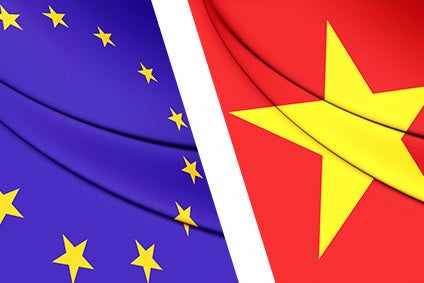
The EU-Vietnam Free Trade Agreement (EVFTA) could enter into force by early summer 2020 after the European Council adopted a decision on the conclusion of the deal.
Vietnam is the EU’s second-largest trading partner in the Association of Southeast Asian Nations (ASEAN) after Singapore, with trade in goods worth EUR47.6bn (US$51.91bn) a year and EUR3.6bn when it comes to services. The main EU imports from Vietnam include telecommunications equipment, clothing and food products.
At present, only 42% of Vietnamese exports to the EU currently enjoy zero tariffs under the Generalised System of Preferences (GSP).
In a statement last week, The European Council said it had adopted a decision on the conclusion of the free trade agreement, clearing the path, on the EU side, for the entry into force of the agreement.
Once the Vietnamese National Assembly also ratifies the FTA, the agreement can enter into force, most likely in early summer 2020, it said.
“This agreement is the second one we are concluding with a Southeast Asia country, after Singapore,” says Gordan Grlic Radman, minister for foreign and european affairs of Croatia. “It is also the most ambitious free trade agreement ever concluded with a developing country. We are opening up new trading opportunities, but we are also creating new tools to give impetus to the enforcement of basic freedoms and labour rights in Vietnam.”

US Tariffs are shifting - will you react or anticipate?
Don’t let policy changes catch you off guard. Stay proactive with real-time data and expert analysis.
By GlobalDataThe FTA provides for the almost complete (99%) elimination of customs duties between the two blocks: 65% of duties on EU exports to Vietnam will disappear as soon as the FTA enters into force, while the remainder will be phased out gradually over a period of up to ten years.
As regards Vietnamese exports to the EU, 71% of duties will disappear upon entry into force, the remainder being phased out over a period of up to seven years. The FTA will also reduce many of the existing non-tariff barriers to trade with Vietnam and open up Vietnamese services and public procurement markets to EU companies.
The trade deal also contains important provisions on intellectual property protection, labour rights and sustainable development. The FTA includes commitments to implement International Labour Organisation (ILO) core standards and UN conventions relating, for example, to the fight against climate change or the protection of biodiversity. It also includes an institutional and legal link to the EU-Vietnam Partnership and Cooperation Agreement, allowing appropriate action in the case of serious breaches of human rights.
According to the Ministry of Planning and Investment, the EVFTA will help Vietnam’s export turnover to the EU increase by about 20% in 2020, 42.7% in 2025, and 44.37% in 2030.




